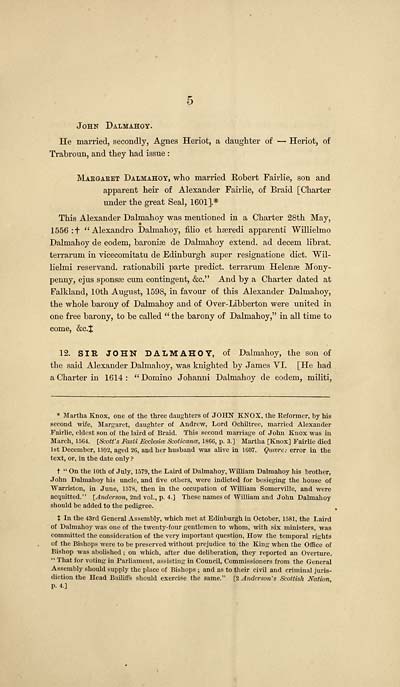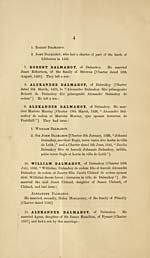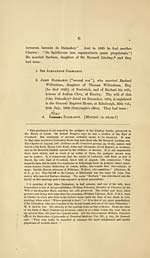Download files
Complete book:
Individual page:
Thumbnail gallery: Grid view | List view

John Dalmahoy:.
He married, secondly, Agnes Heriot, a daughter of — Heriot, of
Trabroun, and they had issue :
Mabgaeet Dalmahoy, who married Robert Fairlie, son and
apparent heir of Alexander Fairlie, of Braid [Charter
under the great Seal, 1601].*
This Alexander Dalmahoy was mentioned in a Charter 28th May,
1556 :t "Alexandra Dalmahoy, filio et haeredi apparenti Willielmo
Dalmahoy de eodem, baronioe de Dalmahoy extend, ad decern librat.
terrarum in vicecomitatu de Edinburgh super resignatione diet. Wil-
lielmi reservand. rationabili parte predict, terrarum Helenas Mony-
penny, ejus sponsoe cum contingent, &c." And by a Charter dated at
Falkland, 10th August, 1598, in favour of this Alexander Dalmahoy,
the whole barony of Dalmahoy and of Over-Libberton were united in
one free barony, to be called " the barony of Dalmahoy," in all time to
come, &c.J
12. SIR JOHN DALMAHOT, of Dalmahoy, the son of
the said Alexander Dalmahoy, was knighted by James VI. [He had
a Charter in 1614: "Domino Johanni Dalmahoy de eodem, militi,
* Martha Knox, one of the three daughters of JOHN KNOX, the Reformer, by bis
second wife, Margaret, daughter of Andrew, Lord Ochiltree, married Alexander
Fairlie, eldest son of the laird of Braid. This second marriage of John Knox was in
March, 1564. [Scott's Fasti Mcclesim Scoticance, 1866, p. 3.] Martha [Knox] Fairlie died
1st December, 1592, aged 26, and her husband was alive in 1607. Qiuere: error in the
text, or, in the date only ?
t " On the 10th of July, 1579, the Laird of Dalmahoy, William Dalmahoy his brother,
John Dalmahoy his uncle, and five others, were indicted for besieging the house of
Warriston, in June, 1578, then in the occupation of William Somerville, and were
acquitted." [Anderson, 2nd vol., p. 4.] These names of William and John Dalmahoy
should be added to the pedigree.
t In the 43rd General Assembly, which met at Edinburgh in October, 1581, the Laird
of Dalmahoy was one of the twenty-four gentlemen to whom, with six ministers, was
committed the consideration of the very important question, How the temporal rights
of the Bishops were to be preserved without prejudice to the King when the Office of
Bishop was abolished ; on which, after due deliberation, they reported an Overture,
" That for voting in Parliament, assisting in Council, Commissioners from the General
Assembly should supply the place of Bishops ; and as to their civil and criminal juris-
diction the Head Bailiffs should exercise the same." [2 Anderson's Scottish Nation,
p. 4.]
He married, secondly, Agnes Heriot, a daughter of — Heriot, of
Trabroun, and they had issue :
Mabgaeet Dalmahoy, who married Robert Fairlie, son and
apparent heir of Alexander Fairlie, of Braid [Charter
under the great Seal, 1601].*
This Alexander Dalmahoy was mentioned in a Charter 28th May,
1556 :t "Alexandra Dalmahoy, filio et haeredi apparenti Willielmo
Dalmahoy de eodem, baronioe de Dalmahoy extend, ad decern librat.
terrarum in vicecomitatu de Edinburgh super resignatione diet. Wil-
lielmi reservand. rationabili parte predict, terrarum Helenas Mony-
penny, ejus sponsoe cum contingent, &c." And by a Charter dated at
Falkland, 10th August, 1598, in favour of this Alexander Dalmahoy,
the whole barony of Dalmahoy and of Over-Libberton were united in
one free barony, to be called " the barony of Dalmahoy," in all time to
come, &c.J
12. SIR JOHN DALMAHOT, of Dalmahoy, the son of
the said Alexander Dalmahoy, was knighted by James VI. [He had
a Charter in 1614: "Domino Johanni Dalmahoy de eodem, militi,
* Martha Knox, one of the three daughters of JOHN KNOX, the Reformer, by bis
second wife, Margaret, daughter of Andrew, Lord Ochiltree, married Alexander
Fairlie, eldest son of the laird of Braid. This second marriage of John Knox was in
March, 1564. [Scott's Fasti Mcclesim Scoticance, 1866, p. 3.] Martha [Knox] Fairlie died
1st December, 1592, aged 26, and her husband was alive in 1607. Qiuere: error in the
text, or, in the date only ?
t " On the 10th of July, 1579, the Laird of Dalmahoy, William Dalmahoy his brother,
John Dalmahoy his uncle, and five others, were indicted for besieging the house of
Warriston, in June, 1578, then in the occupation of William Somerville, and were
acquitted." [Anderson, 2nd vol., p. 4.] These names of William and John Dalmahoy
should be added to the pedigree.
t In the 43rd General Assembly, which met at Edinburgh in October, 1581, the Laird
of Dalmahoy was one of the twenty-four gentlemen to whom, with six ministers, was
committed the consideration of the very important question, How the temporal rights
of the Bishops were to be preserved without prejudice to the King when the Office of
Bishop was abolished ; on which, after due deliberation, they reported an Overture,
" That for voting in Parliament, assisting in Council, Commissioners from the General
Assembly should supply the place of Bishops ; and as to their civil and criminal juris-
diction the Head Bailiffs should exercise the same." [2 Anderson's Scottish Nation,
p. 4.]
Set display mode to:
![]() Universal Viewer |
Universal Viewer | ![]() Mirador |
Large image | Transcription
Mirador |
Large image | Transcription
Images and transcriptions on this page, including medium image downloads, may be used under the Creative Commons Attribution 4.0 International Licence unless otherwise stated. ![]()
| Histories of Scottish families > Family of Dalmahoy of Dalmahoy, Ratho, County of Edinburgh > (11) Page 5 |
|---|
| Permanent URL | https://digital.nls.uk/94914502 |
|---|
| Description | A selection of almost 400 printed items relating to the history of Scottish families, mostly dating from the 19th and early 20th centuries. Includes memoirs, genealogies and clan histories, with a few produced by emigrant families. The earliest family history goes back to AD 916. |
|---|

